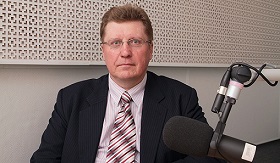Interview
While the situation around the People’s Republic of North Korea remains in a state of stalemate, South Korea has become one of the most rapidly growing centres in Asia which cooperates with Russia. The uncertain future of Pyongyang’s nuclear programme and its economic relations with South Korea have been increasingly in the focus of attention of both of policy-makers and business circles. Dr. Alexander Vorontsov, head of the Korea and Mongolia Section at the Institute of Oriental Studies of the Russian Academy of Sciences, offer his views here.
Interview
While the situation around the People’s Republic of North Korea remains in a state of stalemate, South Korea has become one of the most rapidly growing centres in Asia which cooperates with Russia. The uncertain future of Pyongyang’s nuclear programme and its economic relations with South Korea have been increasingly in the focus of attention of both of policy-makers and business circles. Dr. Alexander Vorontsov, head of the Korea and Mongolia Section at the Institute of Oriental Studies of the Russian Academy of Sciences, offer his views here.
How would you describe the current state of North Korea’s nuclear programme? Is there any hope in the short or long run of the Korean nuclear issues being resolved?
On the one hand, the current status of the North Korean nuclear programme is rather uncertain. It is, however, also clear that its nuclear programme is being continued. The North Koreans at the moment remain outside of any talks or agreements; they have their hands free and are not bound by any commitments. North Korea is sensitive to the fact that its key partners - the opponents in the six-party talks – have so far stalled over the resumption in earnest of the six-party talks, and have instead preferred the policy of isolating North Korea. In this situation, the country has been increasing its efforts to enhance and improve its nuclear capacity and its nuclear missile programme in general.
In that sense, the situation is quite unpleasant. Should it persist, North Korea will continue to develop its nuclear missile capacity along with its peaceful nuclear programme. Authoritative US specialists believe that North Korea is capable of completing its experimental light-water nuclear reactor. North Koreans have put the Yongbyon nuclear power station back in operation, which is, of course, quite alarming. Moreover, they have to do it in isolation from specialized international bodies, without any expert control or support. It is only natural that security at such facilities, should they be completed, cannot but cause the gravest concern and alarm in the neighbouring countries and in Russia, too. What will such a light-water reactor be like? North Korea is building it without any outside help or any international assessment or consultations. Will it be safe enough, will it comply with the present-day security requirements or nuclear safety requirements? There are grave doubts here. It is quite obvious that the international community and Russia should intensify their efforts in trying to affect the way the situation has been developing so far.
Will the agreement to lift visa requirements between Russia and South Korea have any implications? Is it expected to boost trade between the two countries?
The agreement is bound to strengthen people-to-people exchanges and boost tourism. Small businesses will be more motivated to pay attention to South Korea. The decision has undoubtedly created incentives for intensifying humanitarian and economic ties.
What are the prospects for cooperation between Russia and South Korea in the high-tech sector? What steps can be taken to mobilize even more Korean investment in the innovative sector of the Russian economy?
Our cooperation in this area has been long and successful. There are a large number of highly qualified Russian engineers and researchers working in South Korea at the leading South Korean firms in various capacities and under a variety of contracts. There is also an intention to increase the number of research centres in Russia, and attract more Korean investment in Russia.
A significant part of South Korean investment in Russia today is concentrated in the European part of the country. What measures are needed to redirect some of South Korean investment towards Siberia and Russia’s Far East?
The only realistic action here would be to implement the specialized and federal programmes aimed at boosting the development of Siberia and the Far East. They are quite ambitious and may prove of interest to foreign partners, including the South Koreans. Should they be completed, South Korean businesses will arrive in Russia’s Far East. Business tends to go to regions which are more developed, economically and industrially, where there is infrastructure in place, and where there are better opportunities for it. If Siberia and the Far East establish new high-tech havens, acquire new industrial facilities or promote plans for new factories, like the joint project with Japan to build a liquefied gas plant in Vladivostok, it is only natural that investment will flow into the Far East and Siberia.
Does it make sense to set up special economic zones for joint projects?
We have experience there. The special zone was set up in Nakhodka in the 1990s, but it was never properly put in operation. The South Koreans have an interest in developing agriculture in the Far East and in acquiring large areas of our territory under a long-term lease. Given their high level of interest in the sector, this is something to think about, taking into account, of course, our own interests. We must select such territories or regions where it would be mutually acceptable, subject to the terms and conditions that would suit both parties. Russia would hardly want Korea to export all of its agricultural produce from Russia. What is essential, however, is that we ourselves must work hard to develop our Far East and Siberia, implementing ambitious and serious programmes there. That would create new foci of interest for South Korean businesses in the Far East and Siberia.






